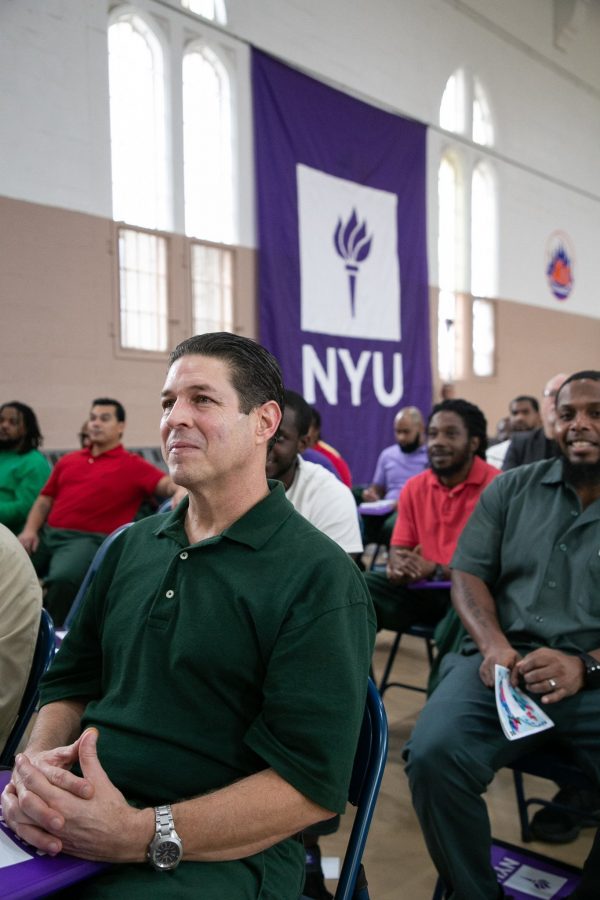In prison, you don’t meet a lot of subscribers to the Wall Street Journal. When you do, you take notice.
John Harnage is one of the few. Harnage has a background in finance, and since being incarcerated in 2010, the result of a fatal drunk driving accident, he’s been sharing what he knows with his fellow inmates. He created an educational program, Trading for Living, a five-day seminar designed to provide a foundation in stock trading for students whose usual idea of trading is a pack of cigarettes for a box of frozen chicken. He estimates that more than 500 inmates have taken the course, not only at Wallkill Correctional Facility, where he resides, but at two other facilities in New York State.
Harnage, 53, who wears his hair styled like Pauly-D and is clean-shaven, said that early on in his financial services career, he realized that while he and his fellow brokers made good money off commissions, their clients didn’t always benefit. He realized that a lack of basic knowledge about the market was to blame, and after being incarcerated, he set out to change that.
But first, he said, he needed to accept responsibility for his own situation.
“Life in prison hasn’t been easy for me,” he said, sitting in his book-filled cell with a labrador puppy (Harnage works with Wallkill’s dog training program) in a carrier under his bed. “It’s been a struggle every day. It’s unnatural — there’s no logic, no reasoning, and everything in this environment is oppressive.” In time, he realized, “I had to completely accept the conditions that I am living in. I had to change my expectations.”
Most of all, he had to change his way of relating to other people. Working as a broker, he said, Harnage had learned to look out for himself and play things “close to the vest.” Ironically, prison made him more trusting. “In an environment where we’re not supposed to trust anyone,” he said, he began to open up to other incarcerated men, “men who like myself tried to do something each and every day to increase their self-worth and personal development.”
Hearing their stories, he discovered that many had received a raw deal. “There were young guys serving very long sentences for selling $40 worth of drugs,” he said. Many were motivated to make an honest living upon their release, but the average prison wages of 25 cents an hour weren’t going to add up to much of a nest egg, and he wondered about their ability to become self-sufficient.
“I’ve noticed the majority of prisoners are from urban inner cities where drug use and crime had become part of the culture,” he said. “Many were also uneducated. It seems like they always wanted to make a name for themselves, to fit in somewhere, and they made poor choices which brought them to prison.”
He resolved to help if he could. “What I will do first is just listen to them,” he explained. “When they let their guards down, I have a chance to help them — whether it’s by sharing my life experience, or my fortitude and inner strength, I help them build on becoming better men.”
He also works in the aforementioned Puppies Behind Bars program, which trains dogs to work with police and military units.
“Because my actions resulted in costing an innocent person their life,” he said, “saving lives through the Puppies Behind Bars program was the ultimate altruistic act of service I’ve committed myself to doing in prison.”
Another way Johnny chooses to give back is by entertaining his brothers through music. Having taught himself to play guitar, he is constantly honing his abilities. “Practice and you will get better at whatever you apply yourself to,” he said. At a recent Wallkill event, he proved that point, making the guitar cry and scream at the same time in a way that had his fellow inmates referencing Jimi Hendrix.
Meanwhile, he’s written three books about the stock market he hopes to publish upon his release, when he also plans to offer a version of his stock-trading class as a five-day seminar.
Whatever happens, Harnage is eager to impart his hard-won wisdom to others — not only his financial know-how but his personal philosophy.
“Not only is life very short,” he said, “but it’s extremely precious. Life is truly a gift. As we walk down whatever path we choose, we need to be responsible and accountable for our actions.”
Before his incarceration, he added, “Success meant living a materialistic lifestyle. Presently and post-prison, success for me is altruism. Prison has taught me that life is truly a gift.”
This story has been approved for publication by an official at the Wallkill Correctional Facility.
Omar Padilla is a student in NYU’s Prison Education Program. Email him at [email protected].


























































































































































